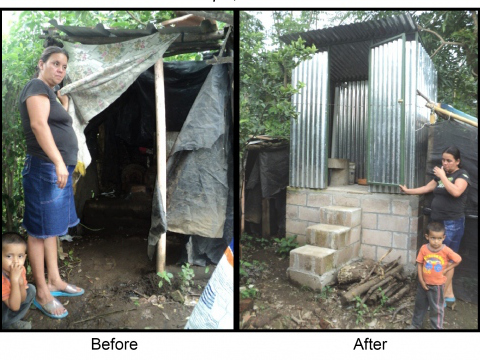Innovative solution helps avoid contamination of soils and water supplies, reduces disease, parasites and dysentery.
Why we care: Shallow pit latrines pose a serious threat to family and environmental health.
How we’re solving this: Building dry composting latrines.
One of the primary causes of surface and groundwater contamination in El Salvador is the deposit of human waste in shallow pit latrines. These makeshift toilets frequently leach into groundwater or overflow and pool on ground surfaces, which poses a serious threat to family and environmental health. However, since they are inexpensive and necessary, pit latrines are prevalent in peri-urban and rural areas.
Trees, Water & People and our partners, Arboles y agua para el Pueblo (AAP), build improved dry composting latrines that consist of two containers for the deposit of fecal matter, with a separator for urine. The latrine is designed so that an average family of five members fills one container in approximately six months. When one side is full, the other side is used, allowing the full side to dry for another six months before it is cleaned out. The fecal matter is left to decompose so that it converts to “biofertilizer”, at the end of six months this mixture will be dry and can be removed and integrated into field soil or used as natural fruit tree fertilizer.
These facilities will help local residents avoid contamination of their precious soils and water supplies, thereby reducing the prevalence and incidence of gastrointestinal diseases, parasites and dysentery. These new and innovative dry composting latrines will be constructed for those either lacking latrines or those currently using inferior latrines which are contaminating their local environment


